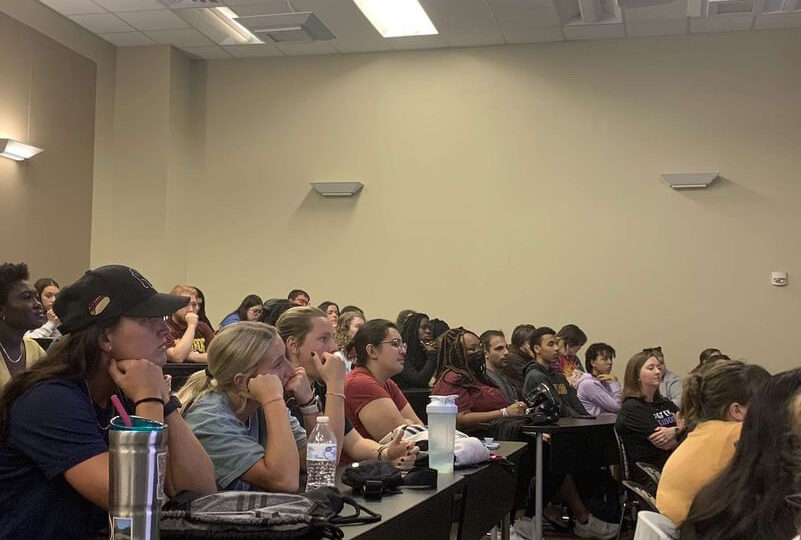Winthrop’s Literary Society and the National Council of Teachers of English (NCTE) held its 12th annual banned book event on October 3 in Owens Hall G02 to educate students about the rising number of banned books and the fight against it.
The room was completely packed. Amanda Covington, one of the three professors lecturing at the event said this year saw “the biggest turn out Winthrop has had from this event.”
“I think it’s important to look at this main question here, which is ‘what do these book bands say about our society? Why is the freedom to read being challenged?’” Covington said.
Covington also countered the argument people may have of banned books when others say ‘why not just buy the book if it’s banned in public libraries?’ “The challenging part of the fact is that a lot of us can buy the books, but the people who are really affected the most by banned books are children under the age of 18,” Covington said. “Their primary access to these banned books are going to be in schools and public libraries, places where they can get information from outside of their homes.”
“Almost 90% of the places where banned books are being challenged are public schools and libraries,” Covington said. “This is where people are supposed to find equitable and open access to knowledge, but these are the places where we’re seeing a negative change.”
She pointed out how banned books have affected us locally. For instance, in Fort Mill, South Carolina, Gender Queer by Maia Kobabe is banned from public libraries.
“Two years ago, Gender Queer was banned in Fort Mill. Our governor, McMaster, actually endorsed a letter in support of the ban saying he was ‘disappointed by the content of the book,’” Covington said.
“Even this year in York county, our public libraries were fighting to keep LGBTQIA+ books in the children’s section of the library. So you can see this is a big national problem but this also affects us at a local level, places that are just right down the road from us.”
Covington emphasized the importance of the conversation, now more than ever, because of the number of books that are being challenged have increased rapidly.
“We want to think about how the amount of banned books has been increasing over the years. Part of the reason why I think this is becoming a much more popular discussion is because, since 2020, the amount of books being banned has increased dramatically. It’s doubled since the year before,” Covington said. “From January to August of this year 3,923 books have been challenged, while if you look back last year it was 2,571 books for the entire year.”
Covington also mentions how the fight to ban books hasn’t just been singular folks or concerned parents, rather it has been organizations.
“A lot of the recent challenges to the books haven’t been as many parents or individuals, but it’s been groups that have been organizing, spreading groups on social media and targeting not only one book at a time but instead several at a time trying to get several books banned.” Covington said.
Covington mentions how this year’s banned books week theme ‘let freedom read’ captures what is at stake now for readers.
“I think this year’s theme ties in perfectly with what’s happening right now with our democracy.” Covington said. “The safety of our right to speak and think freely is directly in proportion to our right to read. This also starts a call to action from us. Readers across this country have to push back on book bans.”
Juniors Desiree Rahn and Genisis Pratt were in attendance and both had a great time at the cultural event.
“I think it was a great event, it was a good idea to have this event and spread awareness,” Rahn said. “I’m a big reader, so I love books. Just the fact that some of these books are banned is just crazy to me. I feel like books are here to help us learn and they shouldn’t be banned.”
Pratt was also in agreement with Rahn. “I’m also a big reader and some of the books that are currently banned are ones I read in middle school, and they helped me figure out things about myself.” Pratt said. “Taking that away from kids who are still learning things about themselves is a really horrible thing to do. Its taking away the root of how they become themselves”
The Literary Society had display boards with information on Banned Books. Rahn mentioned how she had read one of the books they had on display, The Absolute True Diary of a Part-Time Indian by Sherman Alexie. “I read it in middle school,” Rahn said. “I remember reading it and thinking how it was just a really great book, I learned so much about racism, and the book itself just taught me a lot.”




